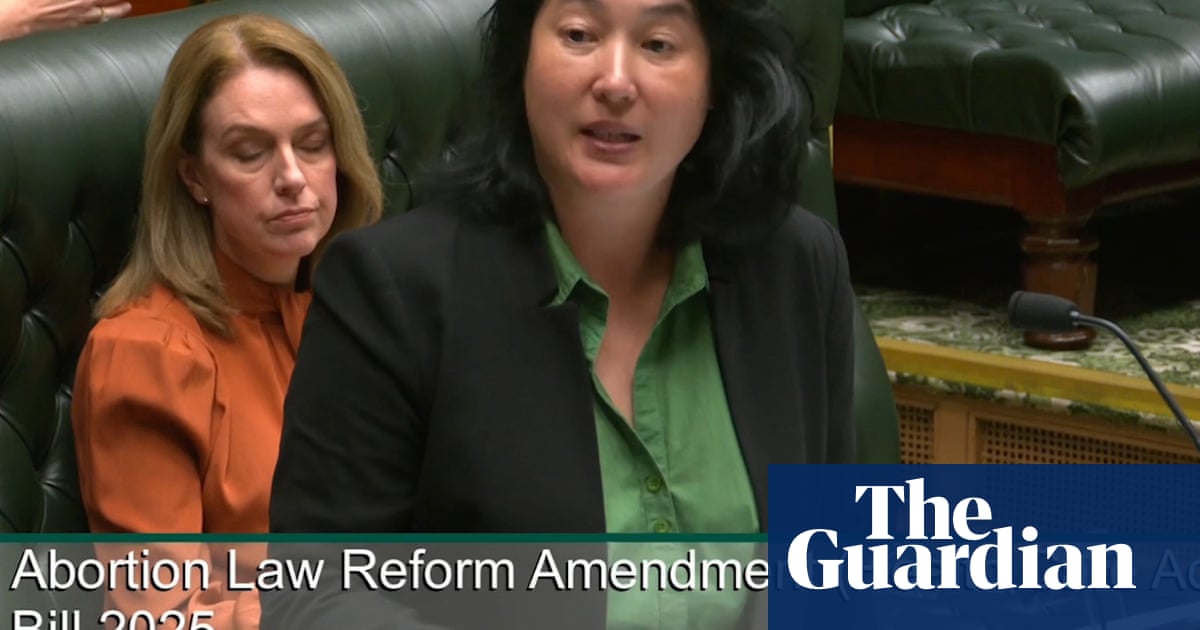New South Wales women will have easier access to abortion pills after the state passed a bill allowing nurse practitioners and registered midwives to prescribe the medication.
The bill – which aims to improve access to healthcare for women in rural and regional areas – passed the lower house on Wednesday, despite vocal opposition including by former prime minister Tony Abbott.
Greens health spokesperson and member of the upper house Dr Amanda Cohn’s bill on medical abortions brings NSW in line with all other states and territories except Tasmania. A medical abortion involves taking prescribed abortion pills up to nine weeks gestation, while a surgical abortion is a procedure undertaken in a clinical setting.
Opposition leader Mark Speakman told the lower house on Tuesday night he supported the bill and refused to “cave to brazen bullying nor to the Americanisation of New South Wales politics” after he claimed in parliament that prominent anti-abortion campaigner Joanna Howe threatened to lead a grassroots campaign against his leadership if he supported the change.
Speakman said the bill would not interfere with freedom of conscience of nurses and midwives and “will probably lead to better, not worse, health outcomes for many pregnant women seeking abortions”.
Independent Alex Greenwich, who moved the 2019 bill decriminalising abortion, supported the new changes and highlighted how many women in rural, regional and remote areas miss out on medical terminations because of delays to accessing care.
Some communities don’t have GPs and even in communities where there are GPs, getting a timely appointment can be difficult, and the only GP in the town might have a conscientious objection, Greenwich said.
“Medical abortions provide the least invasive and lowest risk termination option [… but] they can only be performed up until nine weeks gestation, which means there is a small window of opportunity that could easily be closed by delays,” Greenwich said.
“After that, the only option is a surgical abortion,” he said.
Greens lower house MP Jenny Leong, who introduced the bill in the lower house, highlighted Guardian Australia’s reporting in December which revealedonly three of the 220 public hospitals in NSW consistently and openly provide surgical abortions.
“When reporting from the ABC and The Guardian revealed the scale and prevalence of barriers to abortion access in New South Wales, there was widespread outrage and concern in this place and beyond,” Leong said. “The Greens knew, then, as we know now, that outrage alone without action was not going to be enough, and that is why today, I am so pleased to be able to bring this bill to this chamber.”
All members except the Greens were allowed a conscience vote. The minister for health, Ryan Park, and shadow minister for health, Kellie Sloane, supported the bill.
Park noted the2024 statutory review of the abortion law reform act 2019conducted by NSW Health, which recommended allowing highly qualified nurse practitioners and midwives to prescribe abortion medication in the case of pregnancies of up to nine weeks.
The review noted that while the 2019 legislation decriminalising abortion had resulted in a more supportive environment for women to access abortion care, “it has not always led to improvements in real and equitable access, particularly for women living in regional, rural or remote parts of NSW, Aboriginal women, culturally and linguistically diverse women and women who are socially and/or financially disadvantaged”.
Liberal MP Anthony Roberts said he would not support “legislation that increases the number of people who can administer a procedure that takes a life”.
Roberts, as well as Liberal MPs Monica Tudehope and Ray Williams, were concerned about how the change would affect the health care of women and cited a study of medical abortions from the US-based think tank and advocacy group the Ethics and Public Policy Center published in April, which found an adverse event rate of over 10%, including sepsis, infection or haemorrhaging.
Sign up toBreaking News Australia
Get the most important news as it breaks
after newsletter promotion
In her closing remarks, Leong raised concerns with the reference to that paper, which she said the American College of Obstetricians and Gynaecologists had described as a flawed report based on a faulty methodology.
Labor MP Julia Finn criticised campaign tactics from those opposed to the bill, telling the lower house “some of the campaign tactics engaged have amounted to bullying and spreading misinformation and disinformation—not lobbying.”
She pointed in particular to the behaviour of Howe, who she said pressured members of parliament to vote against the bill andorganised a rally outside NSW parliament,saying her behaviour had been “dreadful”.
Speakman told parliament that Howe emailed him, telling him that if premier Chris Minns voted for the bill and allowed its passage, she would lead a campaign across five marginal seats that are Labor-held.
“She then threatened: However, if you choose to vote for the bill, I will be left with no other choice but to suspend my planned campaign against Labor in order to lead a public campaign aimed at encouraging a grassroots opposition to you as Liberal leader,” Speakman said.
The bill already passed the upper house on Thursday last week. However, it will have to return to the upper house in a few weeks’ time to be officially passed into law due to a typographical error in the bill from the upper house.
Howe has been approached for comment.
